
The Kingdom of Travancore, also known as the Kingdom of Thiruvithamkoor, was an Indian kingdom from c. 1729 until 1949. It was ruled by the Travancore Royal Family from Padmanabhapuram, and later Thiruvananthapuram. At its zenith, the kingdom covered most of the south of modern-day Kerala and the southernmost part of modern-day Tamil Nadu with the Thachudaya Kaimal's enclave of Irinjalakuda Koodalmanikyam temple in the neighbouring Kingdom of Cochin. However Tangasseri area of Kollam city and Anchuthengu near Attingal in Thiruvananthapuram were parts of British India. Bordering the kingdom were the five Tamil-majority Taluks of Madras Presidency to the north, Madurai and Tirunelveli districts of Pandya Nadu region in Madras Presidency to the east, the Indian Ocean to the south, and the Arabian Sea to the west. As of the 1911 Census of India, Travancore was divided into five: Padmanabhapuram, Trivandrum, Quilon, Kottayam, and Devikulam, of which the first and last were predominantly Tamil-speaking areas.

SirChetput Pattabhiraman Ramaswami Iyer, popularly known as Sir C. P., was an Indian lawyer, administrator and politician who served as the Advocate-General of Madras Presidency from 1920 to 1923, Law member of the Executive council of the Governor of Madras from 1923 to 1928, Law member of the Executive Council of the Viceroy of India from 1931 to 1936 and the Diwan of Travancore from 1936 to 1947. Ramaswami Iyer was born in 1879 in Madras city and studied at Wesley College High School and Presidency College, Madras before qualifying as a lawyer from the Madras Law College. He practised as a lawyer in Madras and succeeded S. Srinivasa Iyengar as the Advocate-General of the Madras Presidency. He subsequently served as the Law member of the Governor of Madras and of the Viceroy of India before being appointed Diwan of Travancore in 1936.

Raja Sir Tanjore Madhava Rao, KCSI, also known as Sir Madhava Rao Thanjavurkar or simply as Madhavarao Tanjorkar, was an Indian statesman, civil servant, administrator and politician who served as the Diwan of Travancore from 1857 to 1872, Indore from 1873 to 1875 and Baroda from 1875 to 1882. He was the nephew of the former Diwan of Travancore T. Venkata Rao and the son of T. Ranga Rao who was also the former Diwan of Travancore.
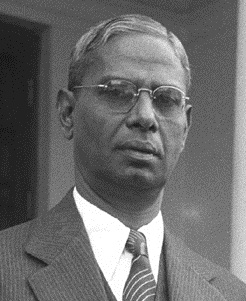
Sir Ramasamy Chetty Kandasamy Shanmukham ChettyKCIE was an Indian lawyer, economist and politician who served as first Finance Minister of India from 1947 to 1948. He also served as President of India's Central Legislative Assembly from 1933 to 1935 and Diwan of Cochin kingdom from 1935 to 1941.
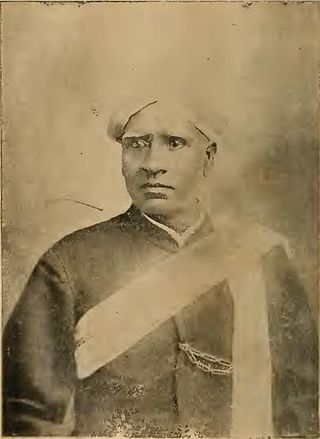
SirKumarapuram Seshadri Iyer, was an Indian advocate who served as the 15th Diwan of Mysore from 1883 to 1901. He was the second longest serving diwan of Mysore after Diwan Purnaiah. He is regarded by most as the maker of Modern Bangalore.

Diwan Bahadur Sir Perungavur Rajagopalachari, KCSI, CIE, also spelt in contemporary records as Sir P. Rajagopala Achariyar, was an Indian administrator. He was the Diwan of Cochin State from December 1896 to August 1901 and of Travancore from 1906 to 1914.
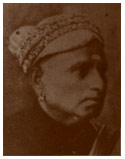
S. Shungrasoobyer (1836–1904), also known as Sankara Subha Iyer or Sankara Stibbaiyar, was an Indian administrator who served as the Diwan of Travancore State from 1892 to 1898.

Sir Amaravati Seshayya Sastri, or Sashiah Sastri, was an Indian administrator who served as the Diwan of Travancore from May 1872 to 4 May 1877 and as the Diwan of Pudukkottai from 1878 to 1894. He is credited with having modernized the city of Pudukkottai.
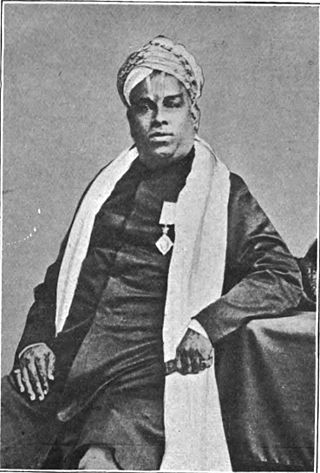
Vembaukum RamiengarCSI was an Indian civil servant and administrator who served as the Diwan of Travancore from 1880 to 1887.

SirVishwanath Patankar Madhava Rao was an Indian administrator and statesman who served as the 17th Diwan of Mysore from 1906 to 1909 and that of Baroda from 1910 to 1913.
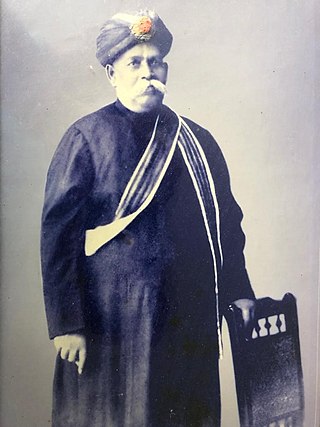
Diwan Bahadur Sir Veeraraghavapuram Nagam Aiya was an Indian pioneer, historian, civil servant, and chronicler who served as the Dewan in the erstwhile princely state of Travancore.
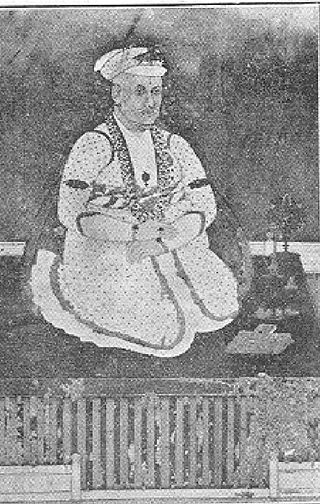
Rai Raya Rai Venkata Rao, was an Indian administrator and statesman who served as Diwan of Travancore 1821–1829 and 1838–39. He was the father of R. Raghunatha Rao, brother of R. Ranga Rao and paternal uncle of Sir T. Madhava Rao.
Thottakattu Sankunni MenonCSI, also spelt as Shungoony Menon, was an Indian civil servant and administrator who served as the Diwan of the Cochin kingdom from 1860 to 1879. His administration is recognized as a period of development. Sankunni Menon's brother T. Govinda Menon also served as Diwan from 1879 to 1889.

SirAlbion Rajkumar Banerjee was an Indian civil servant and administrator who served as the Diwan of Cochin from 1907 to 1914, 21st Diwan of Mysore from 1922 to 1926, and as Prime Minister of Kashmir from 1927 to 1929.

Diwan Bahadur Sir Thiruvalayangudi VijayaraghavacharyaKBE was an Indian civil servant and administrator who served as the Diwan of Cochin kingdom from 1919 to 1922. Vijayaraghavacharya was also a member of the Constituent Assembly of India representing Udaipur.
Diwan Bahadur Cherubala Pathayapura Karunakara Menon (1891–1976) was an Indian civil servant and administrator who served as the Diwan of Cochin kingdom from 1944 to 1947. He was the last Diwan of the kingdom and served until its accession to the Indian Union.
{{Short description|Indian lawyer, civil servant and administrator}}

Sir Joseph William Bhore was an Indian civil servant and diwan of the Cochin State. He is best remembered for his chairmanship of the Health Survey and Development Committee that charted a course for public health investments and infrastructure in India.

Dewan Bahadur or Diwan Bahadur was a title of honour awarded during British rule in India. It was awarded to individuals who had performed faithful service or acts of public welfare to the nation. From 1911 the title was accompanied by a special Title Badge. Dewan literally means Prime Minister in Indian context and Bahadur means brave.
















